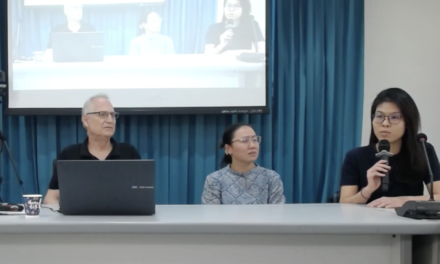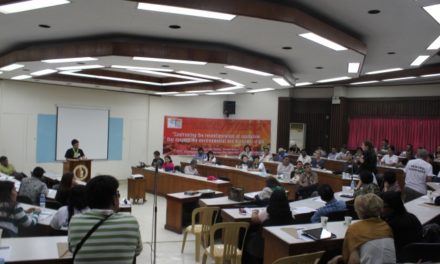President George W. Bush’s absence will be more than obvious when heads of state and tens of thousand of people converge in Johannesburg, South Africa from August 26 – September 4, 2002 at the United Nation’s World Summit on Sustainable Development (WSSD) to mark ten years since the Rio Earth Summit. But present or not, President Bush’s vision for the world will be there. In preparation for the summit, there has been much criticism of the United States for “not being engaged” or “not taking seriously” the WSSD process. But a closer examination of the expected outcomes reveals that nothing could be further from the truth.
The Bush plan for Johannesburg shows more strategic foresight than almost anything the president has proposed in international fora to date. What has been revealed on “the road to Johannesburg” is a grand plan which would incapacitate the United Nations as an institution to meaningfully address the twin crises of global poverty and ecological decline.
While some people may believe the UN needs no help in undermining itself, we all must recognize the need for alternative international institutions outside of the World Trade Organization and International Monetary Fund that can put limits on corporate globalization. Indeed, the United Nations has produced many important legal instruments that can protect poor people and natural systems from being plundered by global corporations. And it is precisely this system of protections, collectively known as the UN’s Multilateral Environmental Agreements (MEAs) that the Bush administration seeks to destroy. Pulling out of the Kyoto Protocol was only a tip of the iceberg; what’s afoot now is a move to withdraw from and subjugate the whole system.
The Bush proposals not only would it transform the foremost inter-governmental forum for addressing global crises into an entirely new apparatus for promoting corporate growth but it could also foreclose even the possibility for real solutions to emerge. Advancing this plan on the road to Johannesburg includes at least three main strategies:
– Rollback Rio by withdrawing from key principles and blocking any new government commitments to implement Rio’s outcomes
– Greenwash globalization by insisting that the best way for governments to implement sustainable development is by advancing the WTO’s new Doha agenda for global free trade
– Export “Enron” environmentalism by shifting responsibility for addressing the crises to corporations via voluntary, public-private “partnerships” in water, energy, and other areas.
As inadequate and in need of reform as they may be, the United Nations and its MEAs embody a legitimate process that has yielded important products that must be defended. In theory and practice, the UN remains the sole international institution where people-driven ideas can be proposed, approved, and implemented as international law. The integrity of these existing mechanisms for countering corporate globalization, as well the strategic space they occupy in today’s international architecture, are “what’s at stake in Johannesburg.”
ROLLINGBACK RIO
The United States is specifically trying to withdraw from at least two key negotiating principles agreed to in Rio:
– “The Precautionary Principle.” This is the idea that governments should err on the side of caution when there is the possibility of devastating and irreparable environmental harm. It is the cornerstone of much public policy-making for the environment and public health. Many technology-based industries (such as biotechnology, chemical, and even communication technology manufacturers) view this principle as hampering the development and deployment of their new inventions. In many ways this is true because it requires that they first “show no harm” before making society bear the risks of their experiments.
The Precautionary Principle has also been the cornerstone of one of Rio’s most important products, the Convention on Biological Diversity’s “Cartagena Protocol on Biosafety,” which establishes the rights of nations to regulate the import of genetically modified organisms, or GMOs. However, this concept clashes with the rules of the World Trade Organization, which says that nations need to use “sound science” by presenting conclusive scientific evidence before enacting any measures that might restrict trade. This is the opposite of the Precautionary Principle. The US wants WTO rules to supercede so that its biotechnology industry will not face trade restrictions to its GMO seed exports. Undermining the Precautionary Principle will reverberate into other international policies, such as those addressing endangered species, persistent organic pollutants (POPs) and climate change, among others.
– “Common but differentiating responsibilities.” This is the understanding that those nations who played the biggest role in causing a problem should take the lead in addressing it. It is especially important to poor nations who do not have the financial or technological resources to act. Many developing nations view climate change, for example, as something caused by the industrialized nations and that they should be the first ones to clean up their act. Most want to take the necessary steps and avoid the high costs of burning fossil fuels in the developing economies, but they will not so do if the biggest polluters do not take prior action. Rejecting this principle (which President George W. Bush’s father agreed to in Rio) would undermine years of inter-governmental negotiations to arrive at general agreements on how to approach the problem.
The United States is also actively blocking attempts by other governments to advance, in Johannesburg, any of the products from Rio. Already scuttled are plans by signatories of the Kyoto Protocol to hold a ceremony that would bring the treaty “into force” in Johannesburg, thereby embarrassing the US who recently withdrew from it. The US has also undermined efforts to fund poor nations’ implementation of Rio agreements. Explaining to NGOs in Bali why the Bush administration is so determined to thwart any new action, the head of the US delegation, Jonathan Margolis, said that timetables and targets are “theater” that “don’t work.” It was suggested he consult with his colleagues in the US Trade Representative’s Office, who never fail to use them in negotiations for new free trade deals.
GREENWASHING GLOBALIZATION
The United States is leading the charge to “greenwash globalization” in Johannesburg by presenting its free trade and investment agenda as synonymous with sustainable development. Negotiators from the US Trade Representative insisted in Bali that advancing the WTO’s new Doha work program is the best way for governments to address poverty and the environment. But the US claim ignores the fundamental fact that free trade agreements, by design, diminish peoples’ ability to use their governments to guide economic activity. Removing controls on corporate conduct is exactly the opposite of what governments need to do to “change economic course” toward sustainable development.
Dissatisfaction with Doha and deep divisions over the impacts of globalization are being played out in several paragraphs of the “Draft Plan of Implementation for WSSD,” including:
45: “It is a matter of great and increasing concern that not all countries are reaping the benefits of globalization, and that some may even be falling behind.” This is the language desired by poor nations to register their dissatisfaction with globalization. The US does not want to allow any official acknowledgement that the global economy causes harm.
82: “establishment of an international mechanism to stabilize commodity prices for coping with the instability of commodity prices and declining terms of trade.” This language is desired by poor nations that reveals a key fight with industrialized nations. After following IMF/World Bank advice, many nations focus on exporting only two or three commodities. But because so many nations followed IMF policies, an enormous over-production has created a glut in global commodity markets, resulting in continually diminishing earnings for nations that produce commodities. When combined with WTO rules that prohibit governments from limiting exports to drive up prices, deregulated global commodity markets are a social and ecological disaster. A new round of international commodity agreements needs to be put back on the global agenda and WSSD is one place where that fight is being taken up. The US strongly opposes any reference to such mechanisms.
87: “imbalance and inherent asymmetry in WTO Agreements” This language is also advocated by poor countries suffering under current trade rules, but against this the US wants to avoid any negative references in official outcomes that may require them to change WTO rules.
88: “implementing the WTO TRIPS (intellectual property rights) Agreement to address public health problems affecting many developing and least developed countries” is what the US wants to reaffirm the global patent regime that makes essential medicines unaffordable for poor nations dealing with HIV/AIDS, tuberculosis, malaria, and other epidemics.
122: “ensure coherence and mutual supportiveness between rules of WTO rules and the rules of MEAs” is proposed text. The US says “coherence” implies that the MEAs would be subordinate to WTO. This is a central issue of governance at play in Johannesburg, where the world’s environment ministers must declare that the fate of the MEAs not be decided by the WTO alone (See “From Doha to Johannesburg,” www.ifg.org).
EXPORTING ENRON ENVIRONMENTALISM
Needing to present some “deliverables” in Johannesburg, the US is trying finalize a package of voluntary, public-private “partnerships” for WSSD. The summit’s Secretary General Nitin Desai has said “partnerships should not be a substitute for new government commitments,” calling them “coalitions of the willing.” But the question Johannesburg is ignoring is what to do with the “unwilling.” That is, the rogue corporations and governments who flout public opinion and international law. They are the real problem and WSSD has shown no political will or meaningful discussion about what to do with them.
The US narrowly defines the problem as “not enough people having access to essential services, therefore we must deliver them to raise standards of living.” While this is an important part of the equation, it falls way short because: 1) it views the solution as being more “growth” of the kind that is already testing social and ecological limits; while 2) ignoring the wasteful over-consumption of resources in the industrialized nations.
One of the most striking elements of the US delegation’s rhetoric is their belief that the problems facing the world are indeed enormous, although their prescriptions may only exacerbate the very problems they seek to resolve. In fact, what they propose as solutions are the same policies that are currently proving disastrous the world around. The Bush Vision is to accelerate, with tax-payers’ dollars, the privatization of essential services like water and energy, through partnerships with no mechanisms for accountability. Call it “Enron Environmentalism.”
Historians may look back at the inscrutable contradictions of this moment: just as corporate corruption has engulfed American financial markets and politics weeks before the global summit (with accusations of personal fraud charged against top Bush administration officials), US negotiators still manage to dominate the WSSD proceedings with lectures to other nations about the need for “good governance” and by insisting that the world should trust unregulated corporate initiatives. But if you can’t trust them with your pension, how can you trust them with the planet?
By prioritizing partnerships in Water, Energy, Health, Agriculture, and Biodiversity (WEHAB), the Bush team is vowing to deliver more “services” via an agenda that can best be described “Cochabamba Plus”, referring to the Bolivian city where the privatization of water delivery services increased prices by as much as 300%, igniting a popular uprising that has become a global flashpoint against privatization. The proposed “energy deliverable” would aim to “by 2015 significantly reduce the number of people without access to secure, reliable, affordable, and cleaner energy services.” Although this may sound laudable, it would be achieved by privatizing energy services, which is entirely in line with US proposals to open up energy services worldwide in the WTO.
While some of these initiatives may be market development opportunities for US corporations, pursuing some of them may not be so profitable. To ensure that the private sector does profit from them, the US is establishing what President Bush is calling his version of a “global Marshall Plan” –the Millennium Challenge Account. The MCA would increase US overseas development assistance by nearly 50%, but conditioning that aid only to those nations that first open their economies to unregulated US trade and investment.
To institutionalize a shift in UN functions, the US wants the CSD to focus on new partnerships by making it the “convenor” business deals with the UN’s seal of approval. Partnerships are not new, and they have never required official government involvement. So there is no reason to use the world’s only inter-governmental forum to sponsor them. Unless the intention is to ensure that the CSD does not undertake something that addresses corporate power.
“WHAT’S AT STAKE IN JOHANNESBURG?”
Corporate greed is decimating our future security, and that of generations to come. Just as privatization and deregulation has allowed CEOs to swindle billions from small investors, so too has it allowed them to steal the natural capital upon which all life depends. As critics of corporate globalization increasingly get asked the question, “what are your alternatives?” they are finding that key elements of an alternative international system are being attack in WSSD. In the emerging international system, which is today dominated by institutions that favor corporate rights, the Bush Vision is a stealth strike on the few structures that can protect people and the planet. If one can recognize that the UN process (originating with its 1972 Stockholm meeting to the 1992 Rio summit to the 2002 Jo’burg summit) and its numerous products (the MEAs) are existing international instruments to counterbalance corporate globalization, then it is easy to see that the survival, and future prospect of, real alternatives are what’s really at stake in Johannesburg.
Victor Menotti is with the International Forum on Globalisation ([email protected])









